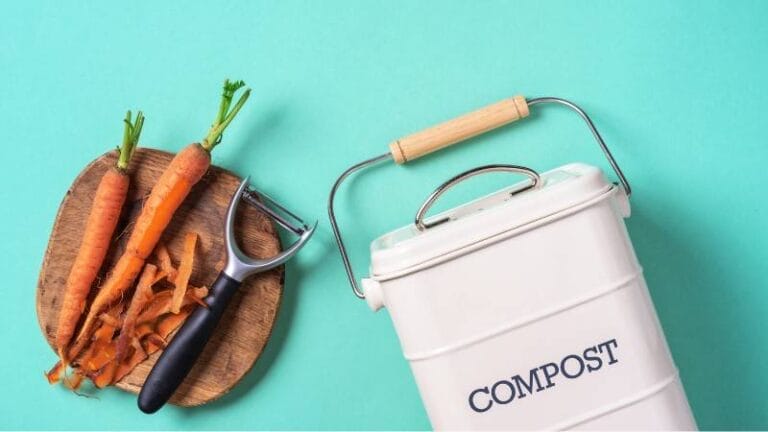Today, I’m thrilled to share my knowledge and insights on a topic that’s close to my heart and crucial for our planet—countertop compost bins. I’ve seen a surge in their popularity recently, and it’s no surprise why!
These handy bins are a simple yet effective step towards a more sustainable lifestyle, allowing us to reduce waste and give back to the earth.
Did you know that by simply composting our food scraps, we can reduce household waste by up to 30%?
It’s a staggering statistic and one that highlights the importance of having a countertop compost bin in our kitchens. It’s not just about reducing waste; it’s about transforming our kitchen scraps into valuable compost that can nourish our plants and enrich our soils.
So, why have countertop compost bins become the talk of the town in sustainability circles?
It’s because more and more people, like you and me, are eager to make impactful changes in our lives to combat climate change and protect our environment. We are realizing the value of turning our food scraps into gold—well, black gold (another name for compost)!
In this blog, I’ll delve deep into the world of countertop compost bins, exploring their benefits, what to consider when buying one, and even how to make one at home.
So, let’s dive in and explore how we can make our kitchens a little greener!
4 Smart Compost Bins from Ethical Kitchen Brands
1. OXO: Everyday Kitchen Tools with a Quiet Commitment to the Planet
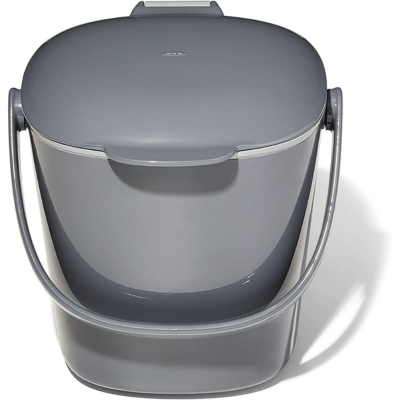
OXO is a household name in functional kitchenware, but their countertop compost bins show they understand more than just smart design — they get the green lifestyle, too. Built with user-friendly touches like smooth interiors for easy cleaning and a lid that flips up with one hand, OXO’s bins make composting feel less like a chore and more like second nature.
While OXO doesn’t lead with eco-messaging, their sustainability efforts are far from performative. The brand is a member of 1% for the Planet and the Climate Action Corps, actively working to reduce carbon emissions and support environmental nonprofits. Their focus on long-lasting, reusable designs helps reduce waste at the source — encouraging consumers to ditch disposable habits in favor of durable alternatives.
From a production standpoint, OXO emphasizes ethical labor practices, inclusive company culture, and community impact. Their compost bin’s sturdy plastic build resists stains and odors — a practical choice for long-term use that aligns with low-waste living. While not made from recycled or biodegradable materials, the bin’s lifespan makes it a responsible option over cheap, flimsy alternatives.
If you’re looking for a compost bin that marries convenience with long-haul durability — backed by a brand with a steady commitment to better practices — OXO quietly delivers.
2. EPICA: Timeless Stainless Steel Meets Kitchen Sustainability
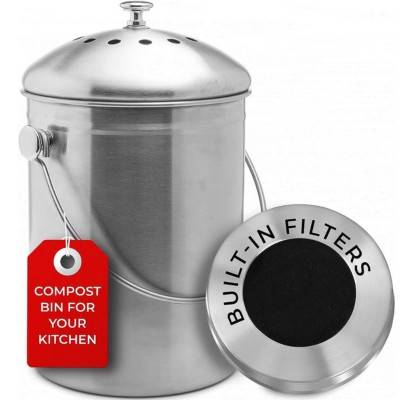
EPICA might not shout its values from the rooftops, but their countertop compost bins speak for themselves. Crafted from solid stainless steel and built to last, these bins have become a go-to for zero-waste kitchens that value both form and function. Their sleek, no-fuss design resists rust and odors — making composting clean, easy, and actually kind of chic.
Sustainability is woven into EPICA’s design DNA. By choosing stainless steel, they reduce the need for frequent replacements and cut down on plastic waste. The charcoal filters in their bins trap smells without chemical deodorizers, nudging users toward healthier and more natural waste practices. It’s a small detail, but one that aligns with a larger mission: minimizing environmental impact through better design choices.
EPICA’s brand messaging doesn’t dive deep into environmental campaigns, but their manufacturing approach leans into simplicity, longevity, and quality — three pillars of sustainable product development. The bins are often used for years without signs of wear, which is a big win for reducing landfill-bound kitchen tools.
For composters who want a product that works hard, looks sharp, and supports a lower-waste lifestyle without fuss or frills, EPICA hits that rare sweet spot between practical and planet-friendly.
3. Yatmung: Composting with a Bamboo-Based, Low-Waste Mindset
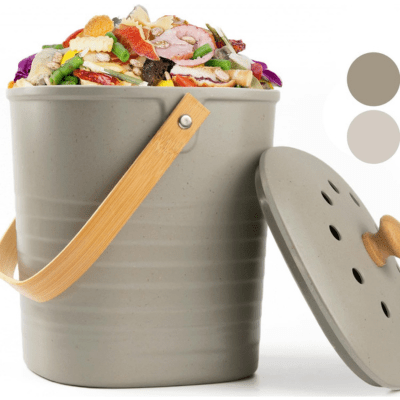
Yatmung isn’t a household name (yet), but their countertop compost bins are making quiet waves among eco-minded homeowners. Their bins are made from bamboo fiber — a renewable resource that offers a lightweight, biodegradable alternative to plastic without compromising on everyday usability.
This is a brand that wears its sustainability on its sleeve. By opting for bamboo-based construction, Yatmung avoids fossil-fuel-derived materials entirely, offering compost bins that are both compostable (in industrial settings) and durable enough for regular use. Even the neutral-toned, minimal design echoes the brand’s nature-first mindset, appealing to those who want their green habits reflected in their home aesthetic.
Yatmung doesn’t publicly share a detailed sustainability roadmap, but their product choices speak volumes. Bamboo is fast-growing, requires fewer resources than wood or plastic, and breaks down cleanly — giving Yatmung’s bins a smaller lifecycle footprint. The focus is clearly on materials, not gimmicks.
For anyone seeking a countertop compost bin that aligns with their eco-lifestyle — without adding another plastic item to the kitchen — Yatmung offers a simple, honest solution that biodegrades with the times.
4. Minky Homecare: British Heritage Meets Everyday Composting Solutions
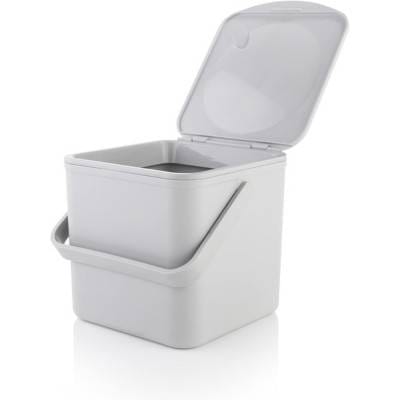
Known for its long-standing roots in UK homecare, Minky brings decades of trusted design into the kitchen — and their countertop compost bins are no exception. With a clean, compact form and easy-access lid, Minky’s caddy makes daily composting more approachable for families who are just getting started on their sustainability journey.
Minky doesn’t market itself as an eco-brand, but its manufacturing principles and product design quietly support low-waste living. Their bins are designed for regular kitchen use — not one-off trends — and help reduce food waste while keeping your countertops clutter-free. The focus on convenience means fewer excuses and more composting.
With production facilities in the UK, Germany, and Asia, Minky emphasizes quality control and reliability in sourcing — and while they don’t spotlight recycled materials, their streamlined, long-lasting designs avoid the quick-break, quick-replace trap. Less breakage means less waste.
If you’re after a practical compost bin from a legacy brand that values usability and product longevity, Minky delivers a no-fuss, family-friendly option — one that fits seamlessly into sustainable routines.
Why Choose a Countertop Compost Bin?
Choosing a countertop compost bin is one of those decisions that might seem small but has a big impact.
Let’s explore why it’s a choice worth considering.
The Benefits of Composting
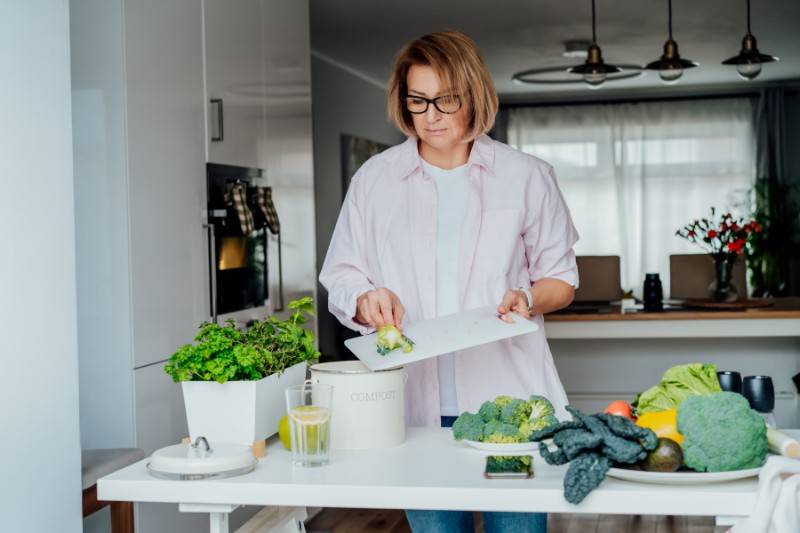
Composting is a game-changer for our environment and our gardens. By composting our kitchen waste, we’re not just reducing the amount of waste going to landfills but also creating nutrient-rich compost that our plants love.
It’s a win-win!
Research shows that composting can enrich the soil, help retain moisture, and suppress plant diseases and pests. Moreover, it reduces the need for chemical fertilizers, encouraging the production of beneficial bacteria and fungi that break down organic matter to create humus, a rich nutrient-filled material.
Countertop composting is a simple way to start this journey. It allows us to conveniently collect our food scraps, like fruit peels and vegetable cuttings, right where they are generated—in the kitchen.
And the best part?
It doesn’t require a lot of space or effort. A countertop compost bin is compact, odor-free, and easy to manage, making it the best compost bin choice for beginners and experts alike.
Is a Countertop Compost Bin Worth the Money?
I know, spending money on something that holds waste might seem a bit counterintuitive. But hear me out. The benefits of having a countertop compost bin far outweigh the initial cost.
I’ve seen firsthand how having a dedicated space for food scraps encourages more sustainable practices. It makes us more mindful of the waste we produce and motivates us to compost more. Over time, the compost produced can replace store-bought fertilizers, saving money and reducing our carbon footprint.
There are also plenty of affordable options available, and if you’re feeling crafty, creating a DIY compost bin is a fun and rewarding project.
It’s not just about spending money; it’s about investing in a sustainable future.
It’s an investment in our planet and a commitment to a more sustainable lifestyle. Whether you buy one or decide to make a DIY compost bin, you’re contributing to a healthier, greener world.
And that, my friends, is priceless.
What to Consider When Buying a Countertop Compost Bin
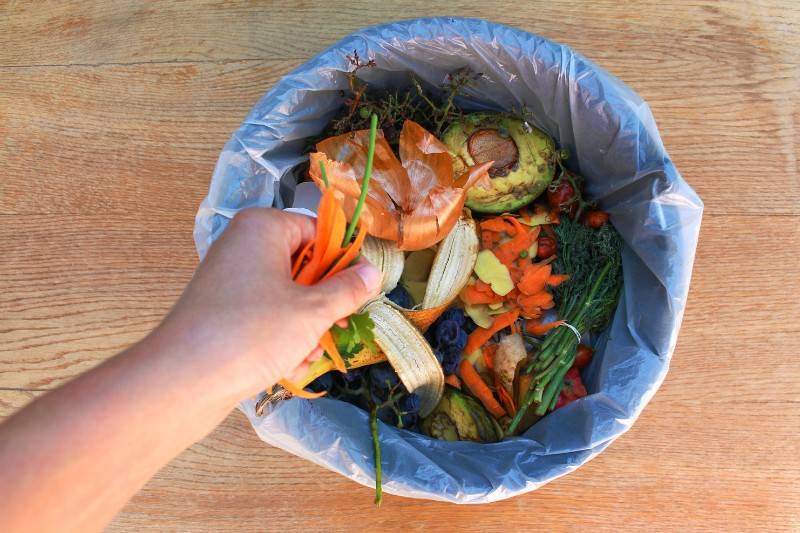
When it comes to choosing the best countertop compost bin, there are several factors to consider to ensure it meets your needs and preferences.
Here’s what to keep in mind:
Size and Capacity
The size and capacity of your countertop compost bin are crucial.
You’ll need to consider the amount of kitchen scraps, like food scraps and coffee grounds, you produce and the space available on your countertop.
For smaller households or limited countertop space, a compact compost pail might be the best fit. Larger households or those with more kitchen waste might opt for a bigger bin.
Remember, it needs to be large enough to hold your food waste but small enough to fit comfortably in your kitchen.
Material and Durability
The material of your compost bin affects both its durability and aesthetics. Common materials include plastic, metal, and ceramic.
Here’s a quick comparison:
- Plastic: Lightweight and affordable but may retain odors.
- Metal (Stainless Steel Bin): Durable and sleek but can be heavier and pricier.
- Ceramic: Stylish and odor-resistant but can be fragile.
Consider what suits your kitchen’s style and your lifestyle. For instance, a stainless steel compost bin might be ideal for a modern kitchen, while a ceramic one might suit a more traditional space.
Budget Considerations
Budget is always a factor.
There are countertop compost bins available in various price ranges, from affordable to high-end. It’s essential to find a balance between price and quality.
Even on a tight budget, you can find options with useful features, like a tight-sealing lid and smooth interior walls, that make composting easy and odor-free.
Special Features
Some countertop compost bins come with special features that can make your composting experience even better.
Look for features like dishwasher-safe components for easy cleaning, a charcoal filter system to control odors, and anti-smell features to keep your kitchen fresh.
Replaceable carbon filters can be a bonus, allowing you to maintain the bin’s odor-controlling capabilities over time.
Whether you’re looking for a basic compost pail or a bin with all the bells and whistles, considering these factors will help you find the best compost bin for your kitchen. And remember, whether you choose a DIY compost bin or a store-bought one, the important thing is to start composting your food waste and contributing to a more sustainable world.
DIY Countertop Compost Bin
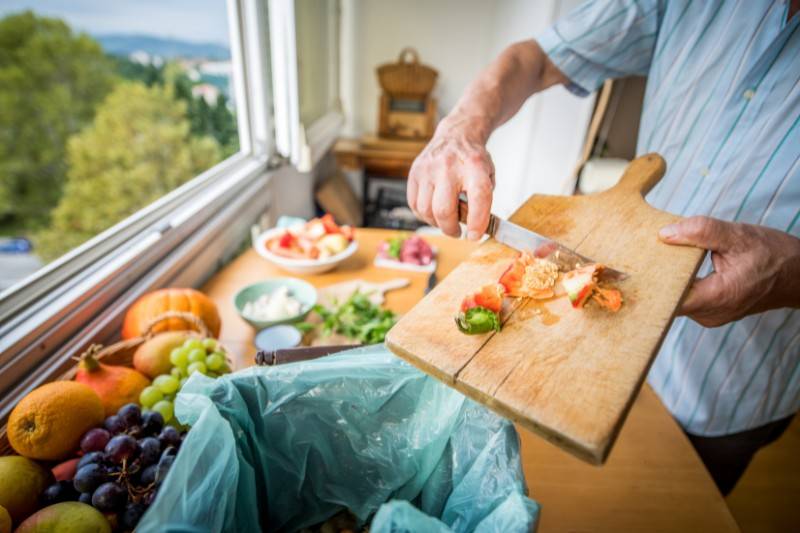
Creating your own countertop compost bin can be a rewarding project, allowing you to independently evaluate and customize your bin to suit your kitchen’s needs, whether you have a small kitchen or cook for a big family.
Here’s a simple guide to help you make your own composter.
Necessary Materials and Tools
To start, gather the following materials and tools. You might already have some of these items in your home, and for others, a quick trip to a local store or an online order should suffice.
- A plastic bucket or a stainless steel pail (to hold the kitchen scraps)
- A tight-fitting lid (to minimize smells and prevent fruit flies)
- Charcoal filters or carbon filters (to reduce odors)
- Drill (for making ventilation holes)
- Brown paper bags or newspaper (as a base to dump the kitchen scraps)
Alternatives
Instead of a plastic bucket, a stainless steel compost bin can also be used for those preferring a more aesthetic look.
If charcoal filters are not available, coffee grounds can also help in controlling bad odors.
Step-by-Step Guide to Making Your Own Bin
- Choose a Suitable Container: Select a plastic bucket or a stainless steel pail of the desired size. Consider how much space you have on your countertop and the amount of kitchen scraps you generate.
- Prepare the Lid: Secure a tight-fitting lid to the container. This is crucial to contain the smells and to prevent leaks.
- Install the Filter: Place charcoal filters or a carbon filter inside the lid to minimize smells. Double-check to ensure it’s securely placed.
- Drill Ventilation Holes: Using a drill, make small ventilation holes on the sides of the container. This will allow the organic materials to breathe, reducing methane gas production.
- Line the Bin: Line the bottom of the bin with brown paper bags or newspaper. This will absorb any excess moisture from the kitchen scraps.
- Start Composting: Start adding your kitchen scraps like fruit peels, vegetable scraps, egg shells, and coffee grounds to the bin. Avoid adding meat or dairy products as they can attract pests and produce bad odors.
- Maintain the Bin: Regularly check the bin, remove the contents to your compost pile or drop-off site when full, and wash the bin. The bin and the lid can be hand washed or placed in the dishwasher if they are dishwasher safe.
Note: Remember to replace the charcoal filters periodically, about once a year or as needed, to ensure continued odor control. If you notice fruit flies or other pests, double-check the lid is secure and consider placing the bin in the freezer between trips to the compost site.

Read More:
Choose Brands That Help You Compost Smarter — and Greener
Not all countertop compost bins are created equal — and neither are the brands behind them. From OXO’s design-first durability to Yatmung’s renewable bamboo builds, each of these companies offers more than just a bin — they offer a way to live more sustainably every day.
Some, like EPICA, focus on timeless materials that reduce the need for replacements. Others, like Minky, blend heritage and practicality into easy-to-use solutions for busy homes. What unites them is a commitment — whether bold or quiet — to reduce waste, extend product life, and make composting a habit, not a hassle.
So when you’re shopping for your next compost bin, don’t just look at the lid or the price tag. Look at the story behind the brand — and choose one that helps you take your eco-lifestyle a step further.
